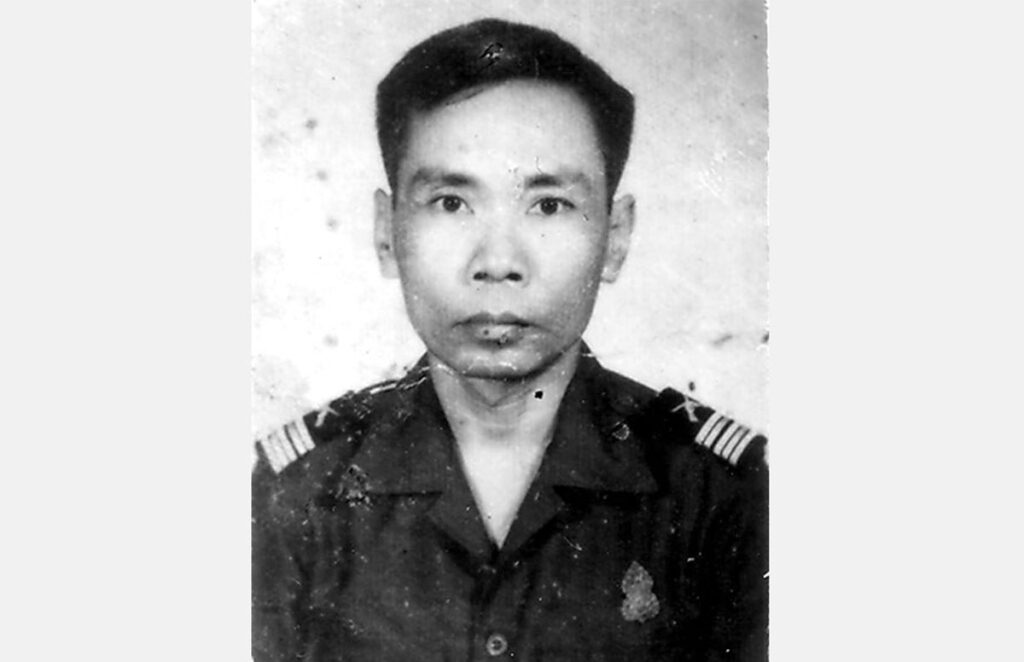My husband Yos Prim first saw me in 1952 and asked my parents for my hand in marriage. After he graduated from high school, he entered a military academy and was promoted step by step. He became a colonel in Lon Nol’s army in 1970.
Before 1975, I saw that my country was very unstable and asked Prim if it was a good idea to escape to Thailand for a while. He said no; he was a strong nationalist and felt that he would betray his country if he left. But he told me that I could go alone. I just could not leave him, so I decided stay in Phnom Penh with him and our eight children.
In 1975, we were evacuated to Kandal Province. I wanted to head to my husband’s home town in Svay Rieng Province, but there were too many people going in that direction. When the Angkar there asked about our backgrounds, I lied and told them that my husband was just a seller.
The Angkar ordered us to grow vegetables and rice. Each morning, I had to carry 80 buckets of water to the plantation. Prim grew rice, built dams, and carried earth, while our children were placed in a mobile brigade.
At 9 o’clock one evening, the Khmer Rouge cadres said that my husband needed to go for education and promised he would return after he finished. Kha-Lok, the cadre who took him away, said, “Don’t worry, the Angkar wants to meet him at the house of old lady Phy. It will just take a moment.” I waited for Prim, but he never returned. Later, Phy said, “Don’t wait for him. Please be careful of what you say or your family will be sent away to be killed. I tell you this because your husband had a bad biography.”
Two months later, the Angkar asked me and the rest of my family to move to Phnom Penh. But they put us on a train to Battambang Province instead, and ordered us to live in a wrecked hut. Then, the Angkar started to divide up my family. Only my six year-old daughter was able to live with me. The rest of my children were sent to build dams and dig ponds 40 km away.
My 17 year-old son died from sickness and starvation; he was alone until I went to the hospital to be with him. He died the night after I arrived. He said, “Mom! I am very hungry. My life now is more difficult than that of an animal. I wish to die so I can be reborn. What is the point of living?” My four sons and oldest daughter died next, each within four to ten days of each other. Some became ill and others were killed. My oldest daughter was married to a man who had been the chief of the provincial town. The Angkar took her away along with her husband and their two children. We never saw them again.
After that, Sum, the village chief, ordered me to give away all of my property. He said I was not a simple Cambodian citizen. I was at least someone with a high position and title like “Mrs.” or “Excellency.” I might be the wife of a businessman, and I definitely was a boss. Sum ordered me to carry waste from the toilets. It was so disgusting that I sometimes fainted. The new people always helped me when this happened. They said that the cadres gave me that job in hopes that I would die very soon.
When the Vietnamese liberated Cambodia in 1979, I decided to walk back to Phnom Penh with my children. When I reached the city, I lived with relatives and worked very hard day and night so my children would become educated. There was nothing more important than being educated.
I was lucky that I had some family members left after 1979. By the end of the regime, I had lost my husband, four sons, a daughter, two grandchildren, and my mother in law, whom I loved as my own mother. One of my relatives went to Tuol Sleng prison and saw my husband’s name on a list there. I was told by a survivor of the regime that Tuol Sleng prisoners were sent to be killed at Boeng Chaeng Ek. Each religious ceremony day, I take food to that killing field and dedicate it to my husband.

